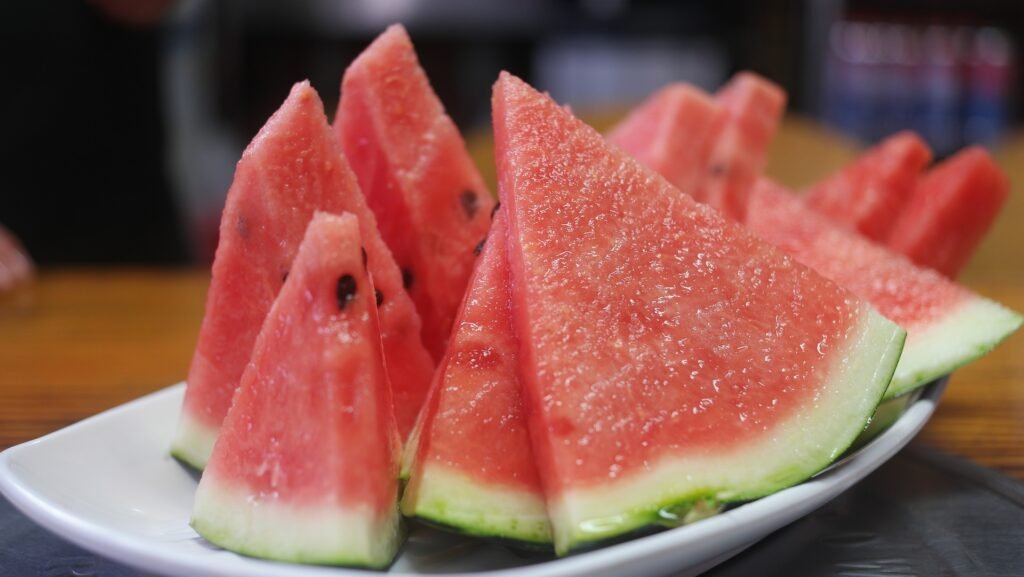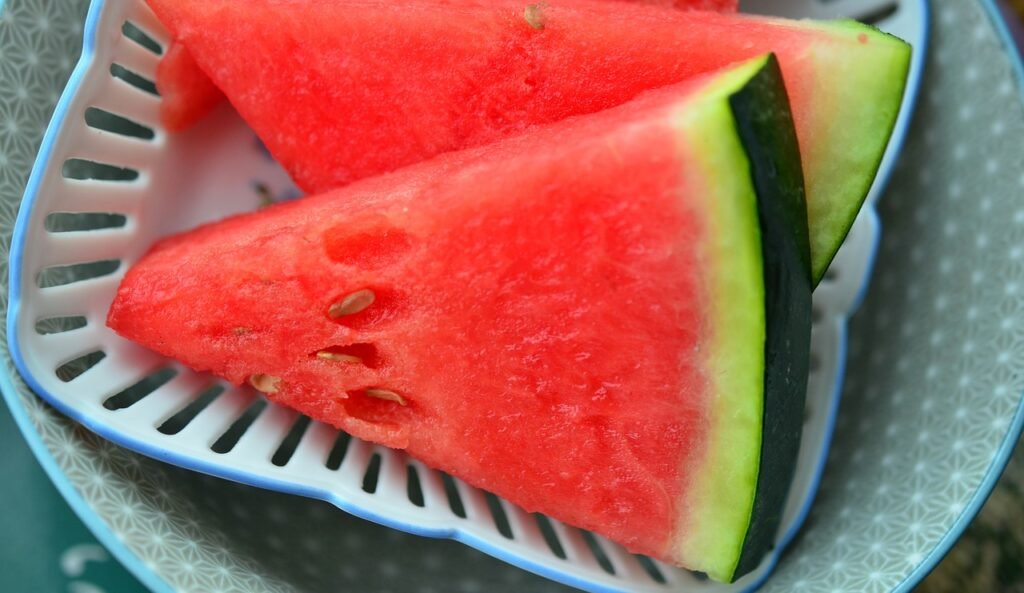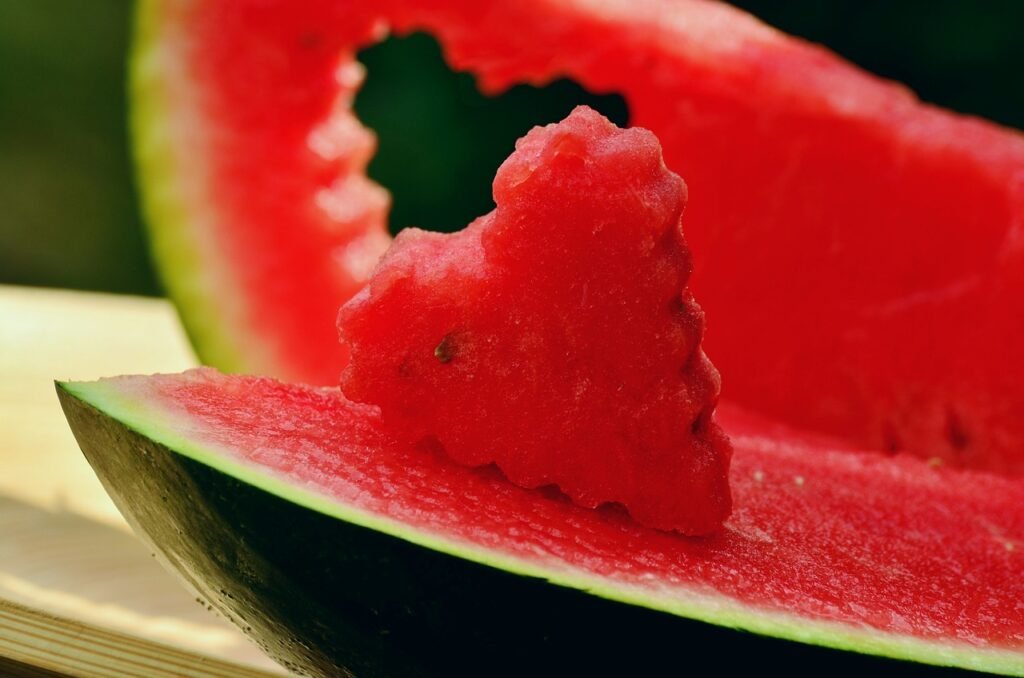Watermelon is full of good stuff like antioxidants and nutrients. It keeps you hydrated and helps your heart and overall health. Plus, it can stop some health problems. Watermelon has been enjoyed for centuries as a tasty summer snack, especially when you’re thirsty. It’s juicy and sweet, with red flesh and seeds. This fruit is loaded with good stuff like vitamins A and C, which are good for your health.
Let’s take a look at some of the awesome things watermelon can do for you!
Watermelon Keeps You Hydrated
It’s essential to keep your body hydrated for it to work well.
Hydration helps with lots of things, like keeping your body temperature normal, organs working right, delivering nutrients to your cells, and staying alert. Foods with lots of water in them can help keep you hydrated. Watermelon is mostly water, so it’s a great choice to help you get enough water every day.

Since watermelon has so much water, it’s also low in calories. That means you can eat a lot of it without taking in too many calories. Eating foods like watermelon that are low in calories can help you manage your weight because they keep you feeling full for longer.
Loaded with Goodness: Nutrients and Plant Power
Watermelon is packed with lots of good stuff like potassium, magnesium, and vitamins A and C. And the best part? It’s low in calories!
Here’s what you get in just 1 cup (152 grams) of diced watermelon:
- Calories: 46
- Carbs: 11.5 grams
- Fiber: 0.6 grams
- Sugar: 9.4 grams
- Protein: 0.9 grams
- Fat: 0.2 grams
- Vitamin A: 5% of the Daily Value (DV)
- Vitamin C: 14% of the DV
- Potassium: 4% of the DV
- Magnesium: 4% of the DV
Watermelon is also loaded with citrulline, an amino acid that might help you do better when you exercise.
And there’s more! It’s full of antioxidants like vitamin C, carotenoids, lycopene, and cucurbitacin E. These antioxidants are really good for your health because they fight off free radicals. These are bad guys that can harm your cells and lead to problems like diabetes, heart disease, and cancer.
Potential Anti-Cancer Effects
Some stuff in watermelon, like lycopene and cucurbitacin E, might help fight cancer.
Scientists aren’t totally sure yet, but some studies suggest that eating foods with lycopene could lower your chances of getting certain cancers, like prostate and colorectal cancer.
Lycopene seems to work by lowering levels of a hormone called insulin-like growth factor (IGF). This hormone makes cells divide faster, which can lead to cancer if it gets out of control.
Another thing in watermelon, called cucurbitacin E, might stop tumors from growing by helping your body get rid of cancer cells.

But we still need more research to know for sure if watermelon can really fight cancer in people.
Heart-Health Advantages
Some of the good stuff in watermelon can help keep your heart healthy. Heart disease is a big problem around the world, and what you eat can affect your risk of having a heart attack or stroke. Eating the right foods can help lower your blood pressure and cholesterol levels, which are important for a healthy heart.
Studies show that lycopene, one of the things in watermelon, might help lower cholesterol and blood pressure, which are both important for your heart.
Watermelon also has something called citrulline, which is an amino acid. It might help your blood vessels relax and widen, which can lower your blood pressure.
Watermelon has other good things for your heart too, like magnesium, potassium, and vitamins A, B6, and C. All of these are good for your heart and your overall health.
Reduce Inflammation and Oxidative Stress
Inflammation is a big reason behind many long-term diseases. The mix of antioxidants, lycopene, and vitamin C in watermelon might help bring down inflammation and stop damage caused by oxidation.
One study done on animals found that rats given watermelon powder along with their unhealthy food had less stress from oxidation and lower levels of a marker for inflammation called C-reactive protein compared to rats that didn’t get the watermelon powder.
Another study looked at 31 people who were overweight and had high levels of inflammation. They took 500 mg of vitamin C twice a day for 8 weeks. Their inflammation markers went down a lot compared to a group that didn’t take vitamin C.
Lycopene, which is also an antioxidant, might help slow down Alzheimer’s disease. But we need more research to be sure about that.

[…] 5. Watermelons […]